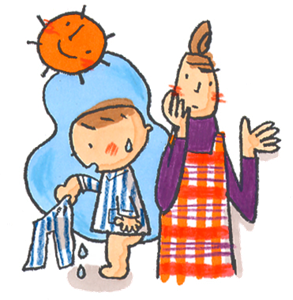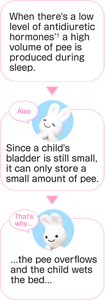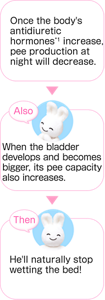- Top
- Information & Tips for Babies and Parents
- Bedwetting Countermeasures
- Basic Knowledge About Bedwetting

Basic Knowledge About Bedwetting

There is no problem during the day, but your child still wets his bed every night! It's natural for him to do this until he is 3 to 4 years old, though. It doesn't just happen to your child, other children may have the same experience.
Bedwetting happens when the pee leaks from the body because there is an imbalance between the pee volume produced at night and the bladder capacity. The amount of pee produced at night is determined by the body's antidiuretic hormones*1 level. The bladder capacity is determined by biological development, so the difference varies with individuals.
Even if you've completed your child's toilet training for daytime, it may still take a while before he completely stops wetting the bed. Do equip yourself with accurate knowledge about this matter so you can monitor your child in a relaxed manner!
Why does my child wet the bed?



How can I make my child stop wetting the bed?



Advice from the doctor
After finally training their children to come off diapers during the day, some mothers observe that their children are still peeing in the night. Nevertheless, they let them go without diapers at night as well, thinking it should be alright, only to wake up to wet bedsheets and a sense of disappointment. Please think of your child's toilet routine during the day and the night as separate issues. Unlike daytime toilet training, where much of the success depends on how the child is able to display signs to answer nature's call, peeing at night is largely a biological issue.
Bedwetting is not due to the mother's failure or the child's lack of effort. Wait patiently for your child's body to attain the right stage of development. Most children naturally stop wetting their beds by the time they reach 5 years or older.
No worries about bedwetting before age 5 to 6!
Bedwetting before age 5 is often due to biological reasons like a deficient secretion of the antidiuretic hormones*1 or small capacity of the bladder, amongst others. You could even say it's a natural phenomenon. Hormone secretion development varies greatly with individuals, and some children wet their beds every night until they are 4 or 5! Even so, the day will come when the bedwetting naturally stops.
On the other hand, "nocturnal enuresis" is a medical condition that occurs when for some reason, there is a deficient secretion of the antidiuretic hormones*1, or when psychological reasons are causing disturbance in the affected child's sleep rhythm. If your child continues to wet his bed every night after age 5, it may be wise to consult a pediatrician.
*1 - Antidiuretic hormones
The hormones are released from a part of the brain called the pituitary gland, and it regulates pee volume. When your child is fast asleep, a large amount is released, signalling the kidneys to work at thickening the pee being produced, thus reducing the volume. As the child's sleep rhythm progresses into a grown-up's, he will start producing a huge amount of antidiuretic hormones during the night. As a result, his pee volume decreases when he is sleeping at night.
Vetted by:
Maternity & Gynaecological Clinic
820 Thomson Road, Mount Alvernia Medical Centre, Block A #B1-01, Singapore 574623
- Top
- Information & Tips for Babies and Parents
- Bedwetting Countermeasures
- Basic Knowledge About Bedwetting





